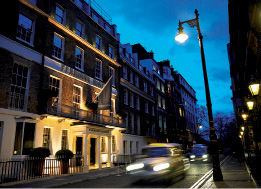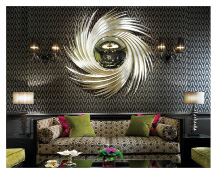- Home
- Media Kit
- Current Issue
- Past Issues
- Ad Specs-Submission
- Ad Print Settings
- Reprints (PDF)
- Photo Specifications (PDF)
- Contact Us

![]()
ONLINE

Editors' Note
Simon Scarborough has held his current post since January 2002. Before joining Flemings, Scarborough worked for Thistle Hotels, most recently as Resident Manager at the Thistle Tower Hotel, London. He was also General Manager of the Thistle Kensington Gardens Hotel, London, and the Thistle Ship Hotel, Surrey. Scarborough has also held positions within Forte Hotels in Dublin and the Thistle Brands Hatch and Thistle St Albans hotel. He gained a BTEC National Diploma in Hotel Management from Norwich Hotel School in 1985.
Property Brief
Flemings Hotel in Mayfair (www.flemings.co.uk) was founded by Robert Fleming in 1851. Today, Flemings Hotel occupies six interconnecting Georgian townhouses bordering Half Moon Street and Clarges Street in Central London, is privately owned, and offers 119 deluxe rooms, 10 executive suites, and luxury apartments over four stories. The property’s newly renovated Looking Glass Room can accommodate up to 24 people for spectacular meetings or intimate events.
We’ve been doing a lot of work in the States and the U.K. The first house was built in the 1730s, but it has been Flemings Hotel since 1851. It started with one house and now it has six townhouses. Mayfair is such a great location so, for years, Flemings ticked along and people knew of it. But I was brought on eight years ago to do a refurbishment and a repositioning of Flemings, because we are one of the oldest hotels in London.
We have a lot of repeat guests that stay with us, but we need to get the message out there that we are very English, but we have a beautiful contemporary style as well. We have 129 bedrooms that were all refurbished five years ago. We also did the front hall, and the front and the back of the building. We wanted to restore the house to what it should look like, so if the windows weren’t the correct size, they were taken out and the correct size was put in. We took the drainpipes down and made them look how they should when the house was built. Even the railings, which had many years of thick black paint on them, were taken away and stripped down.
We want a new clientele to come here and mix with our existing clientele. We have 20 percent of businesses from the U.S. market, so we’re keen to get more of an international clientele. Already there is a very high repeat factor of 70 percent. We’ve spent multi-million pounds on the renovation.
We are also extremely discreet, which is important, but sometimes being too discreet is a bad thing. We have a few stars that stay with us and what they like is that they have their own apartments with their own front door. So it’s getting to that new market to tell them about it so they know about us.

Flemings Hotel
We have about 16 different room designs, but our designer Grant White is good about mixing schemes, so the rooms match each other but they each have a different feel.
It is, because most of our U.S. guests come to stay for six nights. They’re not going to eat in my restaurant every night, even if they like it, because they want to go out in London to experience food and other things. But what we’ve done with the new restaurant design and with our new Chef Simon is to draw a lot of outside clients who use our restaurant and we’ve marketed it to that. With a restaurant, if it’s half empty and you walk in, you don’t want to eat there. But now our residents are seeing it’s full so they want to eat there. The bar is the main area, and we have a lot of local clientele from 5 to 8 PM that come after work and drink and we serve food in there as well, so that draws the residents.
For us, technology has sped everything up. Guests can check in quicker. We offer free Wi-Fi and other things to make their lives easier. But I also handwrite cards to all the guests, welcoming them.

The Front Room
It is very important, because guests like to feel welcome and secure. You have to look after the guests you have and treat them right. We have some staff that have been here 20 years and some for eight, but it’s a fine balance.
Rates in London are going up again. We have done a lot of sales work in Germany, France, Switzerland, and Sweden, so we changed our mix slightly. Our principal client is U.K. corporate, then the United States, and then Germany, France, Sweden, and everything else.
Rates are not an issue now, but we’ve always been very fair with our rates. While it’s not cheap to stay here, our rates are reasonable.
My mother and father used to do a lot of entertaining and I loved it. At six years of age, stirring the sauce in the kitchen, I said, I’m going to be a hotel General Manager. I went to catering school at 16 and I’ve never looked back. It’s a great industry to be in.•